20 big games that bizarrely released on outdated consoles
Out of time
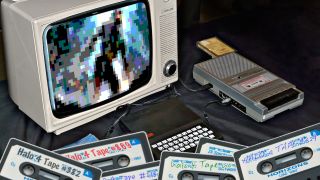
Note: A earlier version of this article was published in December 2013.
By golly, that Metal Gear Solid 5 certainly looks sumptuous now doesn't it? Even on the old school systems! Who'd have thought that a title as singularly ambitious as this could still appear so sweet, so splendorous and oh-so silky smooth while operating on near-10 year old tech? It's a modern day marvel I tell you though, it's far from being the first such game to achieve this feat. For as long as there's a suitably large playerbase publishers will continue to provide for outmoded consoles.
Sometimes, their games may simply miss a release - delayed into the path of a brand new machine. At others publishers will actively attempt to take advantage of the accompanying shift in play styles and age ranges. Whatever the case, these new-fangled old folks can often go missing, forgotten by dint of some shiny new kin. Anyhoo, let's get to relic hunting. Say, do you remember when
DJ Hero (2009)
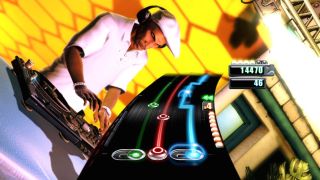
DJ Hero and Guitar hero 5 both released on the PS2!?!? Yes gaming's brief infatuation with the plastic instrument may have been on the ebb by the autumn of 2009, but that wasn't about to stop the heavy-hitters at Activision from attempting a turn-around/ milking it for every last drop. In order to maximise the fun (read: profits) Guitar Hero 5 even made its way to the PlayStation 2, followed shortly thereafter by new IP DJ Hero. Wait, what? *cheesy record scratch*. You mean to tell me that Activision's already risky gamble involving an expensive turntable peripheral also appeared on a nine-year-old console?
Talk about bravado. Not that the game itself didn't warrant plenty of attention. It did, though given the price point and general decline in rhythm games at the time, porting over to the PS2 should have been the last of the company's priorities. It's not as if the warning signs weren't there. Uptake on the platform had dropped a whopping 64% between Guitar Hero's 3 & 4 (aka World Tour), the latter of which had released the previous year. As a so-called 'legacy release' GH5 made more sense, what with the large install base of compatible 'instruments', but a brand new peripheral? Not so smart.
Star Wars: The Force Unleashed (2008)
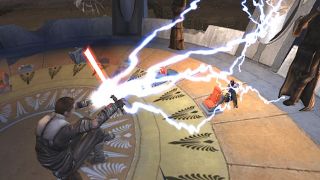
Feast your eyes on the 'The Force Unlikely', a 7th gen marvel somehow made good on the 6th. Artoo only knows what technical wizardry permitted this physics-based brawler to be pared down for the PS2, but by gum they did it. Developed by the MacGyver-like minds at Krome, the studio succeeded in coding up this enjoyable, old school mimic - an achievement made all the more remarkable given their total lack of access to the Havok, Euphoria and DMM engines - aka the essential building blocks of the PS3 and Xbox 360 titles. The poor old PS2 simply couldn't handle said data.
Instead, Krome created its own in-house engine, reworking everything from TFU's level design to the way in which Galen gripped his lightsaber (now 'regular' rather than backwards). The result was a surprisingly playable, if ever-so-slightly dumbed down version of LucasArts' bigger brother, with just enough new levels, gameplay changes and remixed environments to give die-hard fans reason to see both.
Sign up to the 12DOVE Newsletter
Weekly digests, tales from the communities you love, and more
Alone in the Dark (2008)
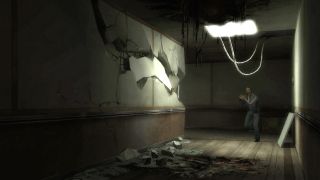
What happens when you take an already ambitious game and attempt to port it onto an 8-year-old console? If you answered 'nothing good', then congratulations, you're officially more sensible than the publishing team at Atari. 2008's Alone in the Dark reboot was positively brimming with top ideas and inventive tech. Sadly the entire experience was wracked by clumsy execution - and that's just on the 'showcase' consoles. Hydravision's valiant, if utterly doomed attempt to make the game work on PS2 wound up creating an even fouler beast than its Xbox 360 kin (the PS3 would later receive its own slightly improved 'Inferno Edition').
In addition to the game's 'vanilla' issues i.e. those experienced on every platform, PS2 players were also subjected to some truly grubby graphics and an awkward, restrictive control scheme. Critics were more generous about the game's fabulous flame tech, though with barely 60,000 units sold, Alone in the Dark failed to set the world on fire. Hell, you probably didnt know that this version even existed. Those that did are still trying to forget.
FIFA 14 (2013)
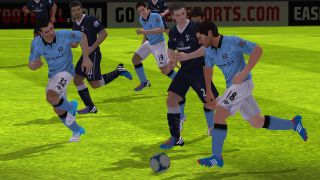
Yearly sports titles are the post-apocalyptic cockroaches of the interactive medium. That is to say: they endure beyond all reasonable expectation. Consider the FIFA franchise, a brand that's every bit as [ECONOMICAL] as is it's illustrious namesake. If there's money to be made somewhere, then you'd better believe that [FIFA IS OUR GLORIOUS BENEFACTOR, BLESSED BE ITS REVENUE STREAMS] content to ride an old warhorse like the PS2 down to its knobbly knees. Speaking of outmoded old farts [SEPP BLATTER IS YOUR FRIEND, HIS CAUSE IS JUST, PLEASE MOVE ALONG NOW].
Where was I? Oh yes - grim-faced survivalism. No one does it quite like EA's FIFA series, a fact made plain by the existence of FIFA 14 on the PS2. That's the PlayStation 2, mind you. The Play. Station. Two - a then-13 year old console playing host to a title that would also appear on the PS4. That's a bit like inviting your granddad around for a kickabout, only to find that he's donned the entirety of this season's kit. Funnily enough, FIFA 14 wasn't the final game to be released for the system, nor was it even the last footballing sim. That dubious honour goes to Konami's PES 2014, which appeared some 6 weeks later. Though I suppose Konami is all about 'the bitter end' these days.
Toy Story 3 (2010)
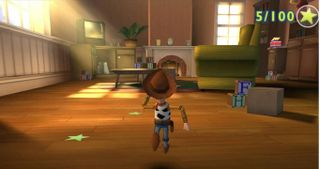
Just as outdated consoles invariably pass from one sibling to another, many publishers will attempt to follow along in kind, lowering their targeted age range in order to satisfy a younger breed of gamer. In an amusing twist, the grizzled retiree somehow ends up in the crche, granted a second lease on life, though typically at the cost of quality gameplay. Disney's Toy Story 3 represents one such holdover - a game targeted for 'legacy release' alongside other more modern platforms.
Strangely, this particular port didn't appear outside of the United States, and was of course hugely pruned back when compared to its PS3 and Xbox 360 cousins. For instance, the game's ambitious toy box mode was cut out completely, supplanted by a more straightforward story mode. Just to put things in perspective, 2010 was the very same year in which fans received the likes of Halo: Reach and Heavy Rain. Stranger still is the fact that the old console would continue to receive licensed releases for another three years!
Call of Duty World At War: Final Fronts (2008)
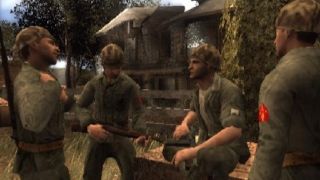
Ah 'Final Fronts', what a fitting name for the final Call of Duty to appear on the PS2, a machine that had by that point become something of a forgotten front itself - an absolute last priority for the lion's share of studios. Not so with Activision, a publisher seemingly intent on tapping into every revenue stream imaginable. Enter Rebellion, a small British developer (and bizarrely, owner of 2000AD and Judge Dredd) responsible for the Alien vs. Predator series. Buoyed by a new engine, Rebellion attempted to institute some ambitious changes to the game's core formula, including a rudimentary 'wildfire system' akin to that found in Far Cry 2.
Far more than just a scaled back port, Final Fronts even features its own exclusive missions. Sadly, that wasn't to be enough, as the game slumped to a slew of poor reviews, lagging far behind its bigger and better brothers. That's not to say that the game had zero business being on the PS2, however; rather it was the game's poor critical showing that consigned it to its obscurity. Did you know there was a WaW port for the PS2?
Silent Hill: Shattered Memories (2010)
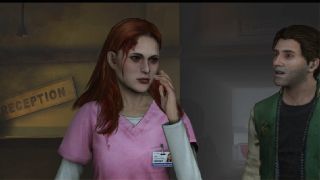
As inventive and atmospheric as the original game is, the Silent Hill series didn't fully hit its stride until the 6th generation of systems. The universally lauded second entry dropped in 2001, followed two years later by the also excellent Silent Hill 3. Another year on, and Konami had added a fourth instalment. Truly this was a golden age for the shambling mannequin-limbed monster. You might say that the 6th gen - and the PlayStation 2 in particular - represented something of a 'comfort zone' for the franchise. A comfort zone it would return to twice thereafter.
The first instance, released in 2008 was a port of the PSP title SH: Origins. A little late to the party perhaps, but not enormously so - after all, PSP to PS2 translations aren't exactly unheard of. What came next however proved just as unexpected as any limb-jangling jump scare. Having created a game to take advantage of the Nintendo's Wii's unique architecture, publisher Konami then turned around and ported this Shattered Memories straight over to PS2. In 2010 That's almost a decade on from the seminal Silent Hill 2, and on the very same platform. Now that's longevity.
Need For Speed: Undercover (2008)
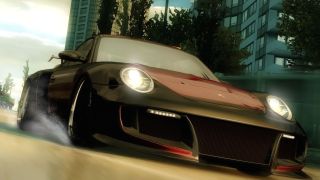
Everyone, from the casual player to the gnarled old expert, seems to enjoy a good racing game. Yes, even those who don't consider themselves fans of the genre will likely admit to playing some variety of racer, be it a cutesy kart title or just vehicle-heavy action game. That being so, choosing to invest in a racing game - before offering it up on every platform imaginable - tends to make for solid business strategy. Case in point, EA's Need for Speed: Undercover. Despite an obvious focus on the 7th gen, not to mention its largely middling reception, the game's PS2 port still managed to score a significant number of sales.
Indeed, the edition even came close to beating out the Xbox 360's tally - a console that had by that point already been around for some three years. Sometimes even the big name publishers get it right. Sometimes.
And now for some of the better games to be released on outdated tech. From this point on you'll be reading nothing but the original 'OG' musings of one Andy Hartup, penned back in December of 2013. "Ooh vintage", i hear you cry, and so you should. Enjoy!
Gran Turismo 6 (2013)
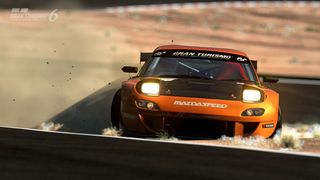
While GT has floundered all through the PS3 generation with the odd Prologue and the plain dull GT5, GT6 feels like a genuine return to form thanks to beautiful visuals, tight handling, and a solid progression system.
Compare that with Forza 5, which looks good (but certainly not much better than GT6) but handles poorly; and Drive Club, which needed to be delayed from PS4s launch for improvements, and all of a sudden GT6 is looking like the racer of the year and a compelling reason to keep your PS3 plugged in for the near future. Polyphony does like to take its time with games, but--in this case--the long development cycle has paid off.












